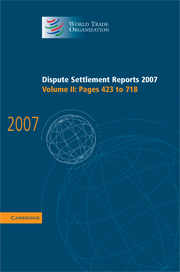Book contents
- Frontmatter
- Contents
- United States – Anti-Dumping Measure on Shrimp from Ecuador (WT/DS335): Report of the Panel
- Chile – Price Band System and Safeguard Measures Relating to Certain Agricultural Products - Recourse by Argentina to Article 21.5 of the Understanding on Rules and Procedures Governing the Settlement of Disputes (WT/DS207): Report of the Appellate Body
- Chile – Price Band System and Safeguard Measures Relating to Certain Agricultural Products - Recourse by Argentina to Article 21.5 of the Understanding on Rules and Procedures Governing the Settlement of Disputes (WT/DS207): Report of the Panel
- Cumulative List of Published Disputes
United States – Anti-Dumping Measure on Shrimp from Ecuador (WT/DS335): Report of the Panel
Published online by Cambridge University Press: 12 December 2017
- Frontmatter
- Contents
- United States – Anti-Dumping Measure on Shrimp from Ecuador (WT/DS335): Report of the Panel
- Chile – Price Band System and Safeguard Measures Relating to Certain Agricultural Products - Recourse by Argentina to Article 21.5 of the Understanding on Rules and Procedures Governing the Settlement of Disputes (WT/DS207): Report of the Appellate Body
- Chile – Price Band System and Safeguard Measures Relating to Certain Agricultural Products - Recourse by Argentina to Article 21.5 of the Understanding on Rules and Procedures Governing the Settlement of Disputes (WT/DS207): Report of the Panel
- Cumulative List of Published Disputes
Summary
INTRODUCTION
Complaint of Ecuador
On 17 November 2005, the Government of Ecuador (“Ecuador”) requested consultations pursuant to Article 4 of the Understanding on Rules and Procedures Governing the Settlement of Disputes (“the DSU”), Article XXII of the General Agreement on Tariffs and Trade 1994 (“the GATT”), and Article 17 of the Agreement on Implementation of Article VI of the General Agreement on Tariffs and Trade 1994 (“the Anti-Dumping Agreement”) concerning certain anti-dumping measures on frozen warmwater shrimp from Ecuador and, in particular, the United States Department of Commerce (“USDOC”)'s practice of “zeroing” when calculating dumping margins, as applied in these measures. Ecuador and the United States consulted on 31 January 2006 and on several occasions thereafter, but failed to resolve the dispute.
On 8 June 2006, Ecuador requested the Dispute Settlement Body (“the DSB”) to establish a panel pursuant to Articles 4 and 6 of the DSU, Article XXIII of the GATT, and Article 17 of the Anti-Dumping Agreement.
At its meeting on 19 July 2006, the DSB established a Panel in accordance with Article 6 of the DSU to examine the matter referred to the DSB by Ecuador in document WT/DS335/6. The Panel's terms of reference are the following:
“To examine, in the light of the relevant provisions of the covered agreements cited by Ecuador in document WT/DS335/6, the matter referred to the DSB by Ecuador in that document, and to make such findings as will assist the DSB in making the recommendations or in giving the rulings provided for in those agreements.”
On 26 September 2006, the parties agreed that the Panel would be composed as follows:
Chairman: Mr. Alberto Juan Dumont
Members: Ms. Deborah Milstein
Ms. Stephanie Sin Far Man
Brazil, Chile, China, the European Communities, India, Japan, Korea, Mexico and Thailand reserved their third-party rights.
The Panel's meetings with the parties and the third parties were held on 3 November 2006.
FACTUAL ASPECTS
At issue in this dispute is the use by the USDOC of zeroing as applied in respect of three anti-dumping measures on certain frozen warmwater shrimp from Ecuador. The measures as identified by Ecuador are the final determination of dumping, the amended final determination of dumping, and the anti-dumping order.
- Type
- Chapter
- Information
- Dispute Settlement Reports 2007 , pp. 425 - 512Publisher: Cambridge University PressPrint publication year: 2009
- 1
- Cited by

